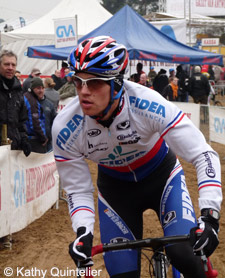 Zdenek Stybar’s home victory for the Czechs in Sunday’s World Championships was not unexpected, as he has been one of the three or four outstanding cyclocross riders this season. The fact that he is not from Belgium though, means that his victory gave the nation that dominates – some would even say owns – this branch of the sport a return of zero rainbow jerseys from the weekend’s races.
Zdenek Stybar’s home victory for the Czechs in Sunday’s World Championships was not unexpected, as he has been one of the three or four outstanding cyclocross riders this season. The fact that he is not from Belgium though, means that his victory gave the nation that dominates – some would even say owns – this branch of the sport a return of zero rainbow jerseys from the weekend’s races.
The medal table of the four races (junior, under-23 and elite men, and women) is an even more depressing reading for the Belgians: A return of just two medals (Sven Nys’ silver and Klaas Vantournout’s bronze from the elite men’s race) is the country’s worst return since 1996. In terms of top-ten finishes, they managed just six in all races, fourth place behind the Netherlands (9), France (8) and the Czech Republic (7).
Six out of a possible forty is unacceptable, says Het Nieuwsblad’s Bert Heyvaert.
In the junior race, Gianni Vermeersch made the early running, but faded to finish fifth; overwhelming under-23 favourite Tom Meeusen flopped to finish in fourth place, having experienced a slight dip in the incredible form he’s had most of the season; Belgian women’s champion Sanne Cant, an outside hope for a medal, crashed several times and slumped to a disappointing fifteenth; and in the elite race, where the Belgians really expect to dominate, Nys and Vantournout seemed to hesitate when the time came to work together, and Bart Wellens was the only other notable result in tenth.
Outgoing champion Niels Albert failed to finish, citing a lack of motivation once the race seemed lost.
According to Heyvaert, Belgium’s national coach Rudy De Bie attributes many of these results – particularly Stybar’s – to the strength of the racing scene in Belgium.
Only the women’s result can be exempted from this in any way. The lack of investment in women’s cyclocross – and women’s cycling in general – in Belgium, means that the country that usually dominates the men’s sport only qualified two riders for the women’s race. Cant’s less than inspiring result can be attributed to personal misfortune; women’s cyclocross has much more of a Dutch flavour right now.
Riders like Stybar and the Polish Szczepaniak brothers, who took the first two places in Saturday’s under-23 race, ply their trade on some of the strongest teams in Belgium, where victory for the sponsor is seen as more important than the nationality of the rider.
“Stybar is the best example,” De Bie says, according to Heyvaert, “the Polish brothers Szczepaniak go the same road. They enjoy that wind of professionalisation that has blown through cyclocross in the last decade. Teams such as Telenet-Fidea, BKCP and Sunweb-Revor ensure that riders can train specifically, taking the sport to higher levels.
“For Belgians and foreigners,” he notes. Stybar, as an example, rides with Wellens for Telenet-Fidea, one of the strongest teams in the sport.
“Yet that does not explain everything,” writes Heyvaert. “Because abroad [where the likes of Stybar come from] a boy of ten doesn’t see two cross races on TV every winter weekend. The temptation of cyclocross in Flanders is still much bigger, so you can expect a much higher percentage of the talent to appear from there, and then you excel in the sport.”
In theory then, the younger categories – junior and under-23 – should be dominated by Belgian riders. “In Tabor this was not the case,” he says.